Princess Beatrice urges young to speak up for themselves
- Published
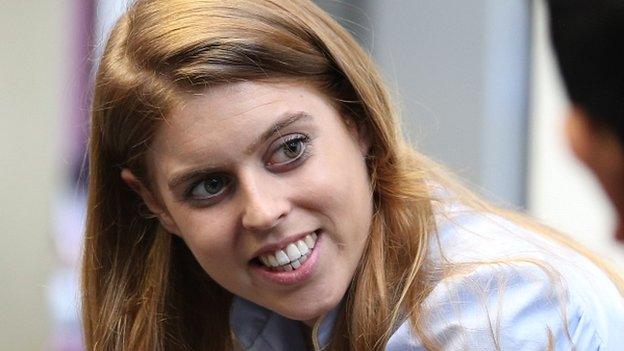
Princess Beatrice, at School 21 in Stratford, says her dyslexia meant exams were "terrifying"
Pupils might often get told to stop talking in class - but a project in an innovative school in east London has been encouraging them to talk more often.
Or at least to be more articulate and confident in speaking up for themselves.
Pupils at School 21, a free school in Newham, were also given some very different perspectives on finding your own voice - from Princess Beatrice.
The princess is co-founder of a charity, Big Change, that supports young people with skills outside a traditional academic curriculum.
This is not one of the capital's wealthier areas.
It is not the stamping ground of yummy mummies. Instead, there is the Mummy Yum chicken and kebab shop on the corner near the school.
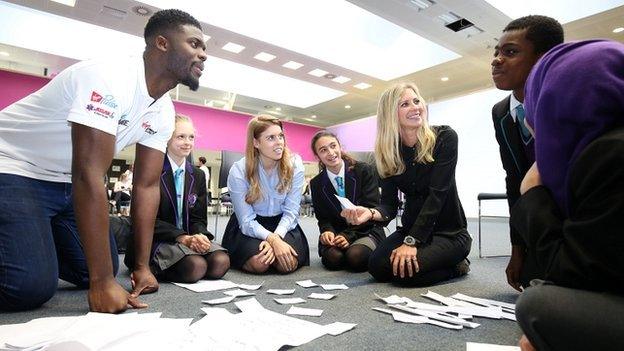
Karl Lokko, Princess Beatrice and Holly Branson helped pupils in a lesson about speaking
But Princess Beatrice says the idea of learning such life skills is important for anyone growing up, regardless of their background. And everyone has had their own inner struggle with trying to communicate.
"For me, school was a nightmare, I struggled," she said, speaking after a workshop with a class of 11- and 12-year-olds.
Dyslexia was her big barrier.
"My earliest memory is trying to read Beatrix Potter and the words were literally jumping off the page," she said.
And "exams were terrifying", despite the support of her teachers.
Princess Beatrice said it wasn't until secondary school, when she could take part in events such as public speaking, that she felt able to do well.
She said lessons in communication being tried at School 21 were "not just about learning for a test, it is learning for your life".
"It is good to be pushed out of your comfort zone," she said.
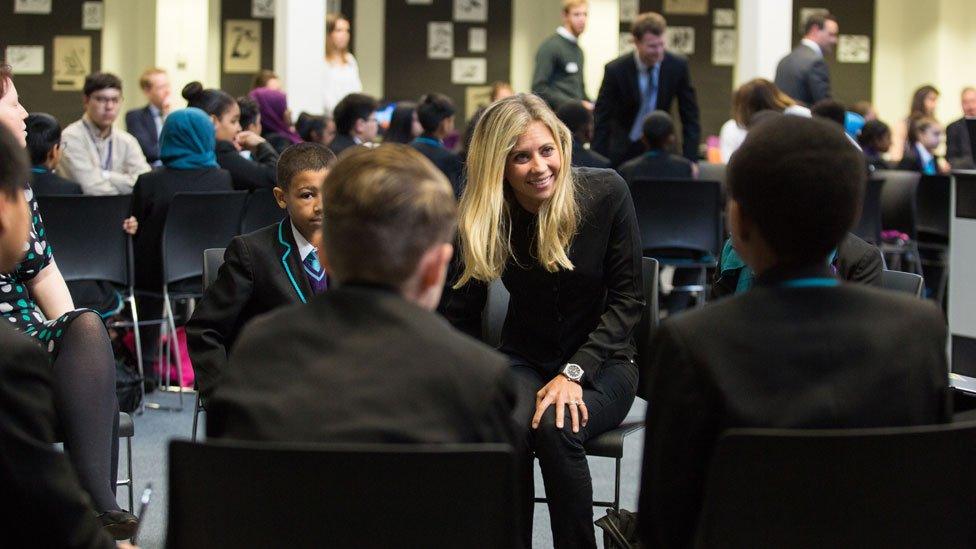
Holly Branson says she disappointed her father by passing her driving test
Also taking part in the project is Karl Lokko, who as a teenager had been a south London gang leader.
He said the day before he had taken his GCSEs, one of his friends had been killed. "He was murdered by my side," he said.
But even being able to "denounce gangsterism" had meant having to learn a vocabulary and way of communicating he had never acquired growing up.
Mr Lokko, who read one of his poems to the pupils, said he had deliberately set about learning 10 new words a day - underlining words he had not understood in books or articles and then looking up their meaning in a dictionary.
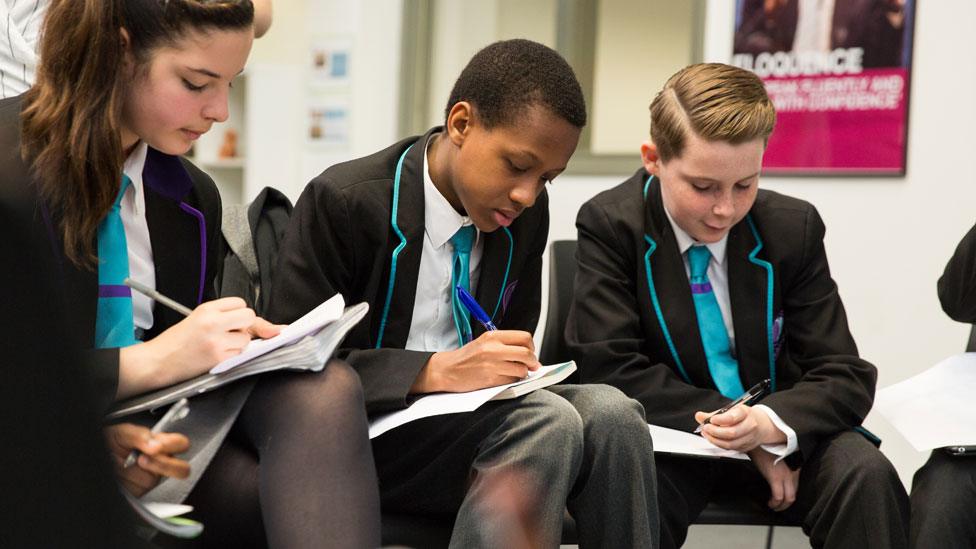
The head teacher of School 21 says that too often there is a "speaking deficit"
Another co-founder of the charity taking part in the school project was Holly Branson, daughter of Virgin founder Sir Richard Branson.
She said that young people from very different backgrounds all faced their own "struggles to find themselves".
"No matter what walk of life, all children face their own pressures, you can't just say that privileged kids don't have issues," she said.
And lessons could be learned from failure as well as success - a message reinforced by her entrepreneurial father.
"I remember when I was doing my driving test and rang my dad to say I'd passed... and there was disappointment in his voice," she said.
"Oh no, really. I just really wanted you to fail at something," he had told her.
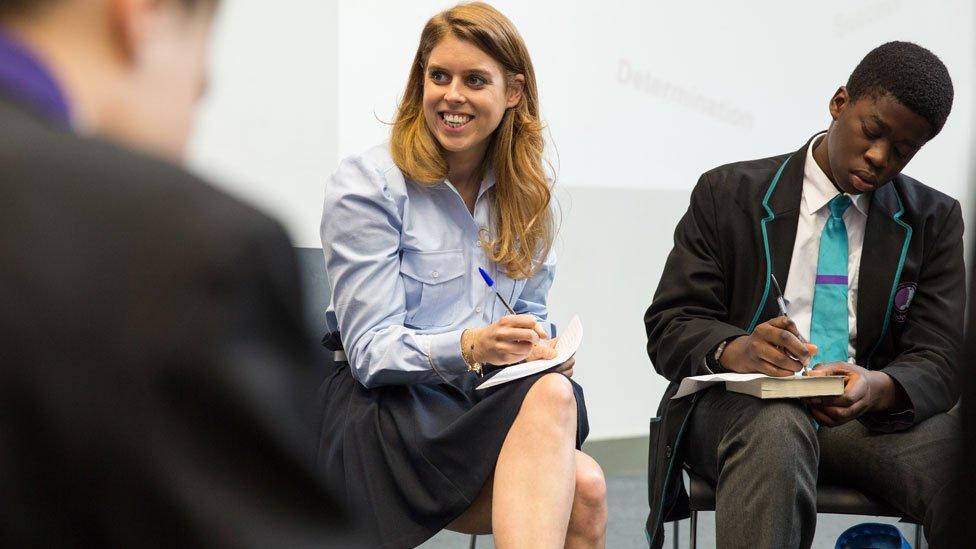
Princess Beatrice was writing poems with pupils at School 21 in Stratford, east London
Ed Fidoe, who helped to set up School 21, said schools needed to be able to create more of those experiences, where young people could be "pushed very hard" and succeed after overcoming difficulties.
The school's head teacher, Peter Hyman, said speaking skills represented a major barrier to disadvantaged young people.
Mr Hyman, a former speechwriter for Tony Blair, warned of a "speaking deficit", adding the skills of "oracy" were at "the heart of social mobility".
Too often poorer youngsters and their families lacked the confidence to speak up for themselves, he said.
Mr Hyman said schools should focus much more attention on helping young people express themselves verbally, not least in terms of improving their job chances.
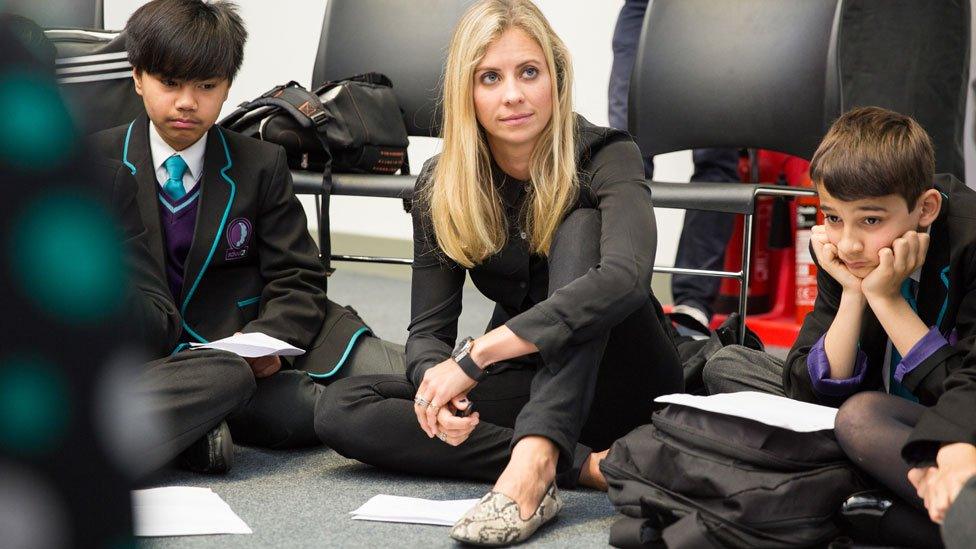
Holly Branson says young people face pressure from social media
The Big Change charity is raising funds for projects to "help young people thrive in life, not just exams".
And Mr Hyman links speaking skills to children's sense of wellbeing.
There have been many recent concerns about the wellbeing of young people and worries about increasing problems with mental health.
Holly Branson links it to the relentless pressures to conform with the artificial world of social media, saying young people needed to be shown the "online world is not the real world".
Princess Beatrice. said: "It's a really important thing to tackle.
"We can do something that focuses on the symptoms of stress - but it's better to get to the root causes.
"What is this extra pressure? Why do we have young people leaving school not equipped for life? How are we letting them down?
"We live in a world where everything is moving at such a fast pace.
"You have to find an identity that's true to yourself.
"You really have to find your own voice."